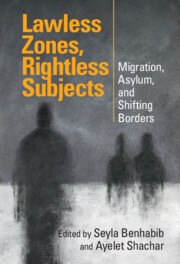Refine search
Actions for selected content:
9 results
Rebels and Rivals in a Syrian Town: Musa al-Naddaf, Syrian Nationalist Rebel, Colonial Fugitive, West Virginia Grocer, 1899–1963
-
- Journal:
- International Journal of Middle East Studies , First View
- Published online by Cambridge University Press:
- 25 September 2025, pp. 1-24
-
- Article
-
- You have access
- Open access
- HTML
- Export citation

Lawless Zones, Rightless Subjects
- Migration, Asylum, and Shifting Borders
-
- Published online:
- 02 January 2025
- Print publication:
- 09 January 2025
-
- Book
-
- You have access
- Open access
- Export citation
“The West of Their Imagination”: Transnational Impression Management and Canadian Migration in the Nigerian Youth Imaginary
-
- Journal:
- African Studies Review / Volume 60 / Issue 3 / December 2017
- Published online by Cambridge University Press:
- 14 August 2017, pp. 141-158
-
- Article
- Export citation
Negotiating Love and Marriage in Contemporary Senegal: A Good Man Is Hard to Find
-
- Journal:
- African Studies Review / Volume 58 / Issue 2 / September 2015
- Published online by Cambridge University Press:
- 01 September 2015, pp. 205-225
-
- Article
- Export citation
Singapore's Changing Demography, the Eldercare Predicament and Transnational ‘Care’ Migration
-
- Journal:
- TRaNS: Trans-Regional and -National Studies of Southeast Asia / Volume 2 / Issue 2 / July 2014
- Published online by Cambridge University Press:
- 26 June 2014, pp. 247-269
-
- Article
- Export citation
15 - Cognitive architecture of the dialogical self: an experimental approach
- from Part II - Methods for studying the dialogical self
-
-
- Book:
- Handbook of Dialogical Self Theory
- Published online:
- 05 June 2012
- Print publication:
- 24 November 2011, pp 264-283
-
- Chapter
- Export citation
‘Arisen from Deep Slumber’: Transnational Politics and Competing Nationalisms among Syrian Immigrants in Argentina, 1900–1922
-
- Journal:
- Journal of Latin American Studies / Volume 43 / Issue 3 / August 2011
- Published online by Cambridge University Press:
- 08 September 2011, pp. 547-574
- Print publication:
- August 2011
-
- Article
- Export citation
Searching for a “black sky” in the Andes Mountains: A migratory process and identity formation of a Japanese astronomer in Peru
-
- Journal:
- Proceedings of the International Astronomical Union / Volume 5 / Issue S260 / January 2009
- Published online by Cambridge University Press:
- 29 June 2011, pp. 533-538
- Print publication:
- January 2009
-
- Article
-
- You have access
- Export citation
